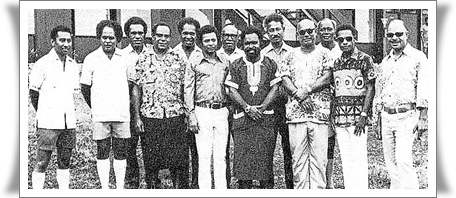How a cop’s son became PM
![]()
 SIR Michael Thomas Somare was the son of Ludwig Somare Sana and Kambe Somare.
SIR Michael Thomas Somare was the son of Ludwig Somare Sana and Kambe Somare.
Ludwig Somare was a policeman from 1922 to 1947, rising to the rank of sergeant.
Having taught himself to read and write, he was subsequently active in encouraging the formation of small businesses and co-operatives, founding the Angoram Co-operative Society which he chaired from 1961 to 1967 and remained active in trading until his death in 1972.
In all, he had four wives and six children, Sir Michael was the eldest.

Born in Rabaul where his father was then stationed, Sir Michael grew up in his family village of Karau in the Murik Lakes district of East Sepik.
His earliest education was in a Japanese-run primary school at Karau during World War II where he learned to read, write and count in Japanese. Meanwhile, Ludwig Somare was in hiding and in fear of his life from the Japanese in Rabaul but he remembers the Japanese with affection.
Sir Michael’s early overseas trips, first as a parliamentarian and then as prime minister, were to Japan.
From 1946, Sir Michael attended Boram Primary School in Wewak, then the Dregerhafen Education Centre in Finschhafen, Morobe and Sogeri High School near Port Moresby, graduating with a Leaving Certificate issued on behalf of the Australian state of Victoria in 1957. This was a teaching qualification at the time. He then taught at several primary and secondary schools, returning to Sogeri High School for further training in 1962-63.
Sir Michael was married to Lady Veronica Somare in 1965, having courted her in traditional fashion, and then immediately left to take up his scholarship at Administrative College. They have five children – Bertha, Sana, Arthur, Michael Jr and Dulciana. He is head of both his own family and that of his wife who initiated him into their title mindamot two days after his initiation as sana.

Sir Michael received several honorary doctorates, the first being from the University of the Philippines in 1976.
He was appointed a member of Her Majesty’s Most Honourable Privy Council in 1977 (the honorific “The Right Honourable” can only be granted when one is admitted to the British Privy Council), and was made a Knight Grand Cross of the Order of St Michael and St George (GCMG) by the Queen in the birthday honours in 1990.)
In 2004 he received authorisation from cabinet to create an honours system for Papua New Guinea. The following year, the Princess Royal invested him as one of the first Grand Companions of the Order of Logohu (GCL).
Sir Michael owed his achievements to East Sepik people

GRAND Chief Sir Michael Somare says his lifelong dream for the country was fulfilled when “we started with peace” during Independence in 1975.
“Now when I am preparing to step out, my dream for the country I have always loved is that we will always institutionalise the principles of peace,” he said.
“My wish is that we will learn to treat our adopted system of government with unwavering respect.”
Sir Michael was addressing his family, relatives, friends from around the country and representatives of foreign missions who turned up at his 80th birthday celebrations in Wewak in April 2016.
He described his retirement that same year as something that would be “difficult”.
“Now I face the real prospect of releasing my official responsibilities and it is the hardest thing I’ve ever had to do in my life,” he said.
“On the eve of my retirement from active politics, I want to say that inactivity for me will pose a few of its own challenges as I have been the East Sepik regional member for 48 years.”
He thanked the people of East Sepik for having faith in him as their leader.
“My people of East Sepik made the transition to self-government possible through their complete and generational trust in my leadership,” he said.
“In my life, I worked locally and interacted globally and my national concerns have always been the most important to me.
“What I would like history to note is this: accountability, humility and passion sit at the centre of any kind of success.”
Sir Michael said the outpouring of altruism and generosity witnessed in the past few days would stay with him forever.
He said only divine intervention helped him survive three heart surgeries in 2011.
“Even when the tide seems to turn on me in recent times, my people proved to me what I had begun to forget by supporting my political aspirations for this great country.
“When I appealed to Sepiks in 1968 to trust me to lead them from colonial rule to self-government, I had no idea that this would be a love story that would span over five decades.”
He thanked his wife Lady Veronica for her love and support in their years of marriage.
“She was a young woman who changed my life so that I could have the credibility at home and professionally,” he said.
“PNG is a melting pot of tribes, clans and families that were never meant to be the same. But despite all this, I have found that it is not a difficult nation to unite.”
“ If the people want any other person to be Prime Minister then let their will be done.” – Sir Michael